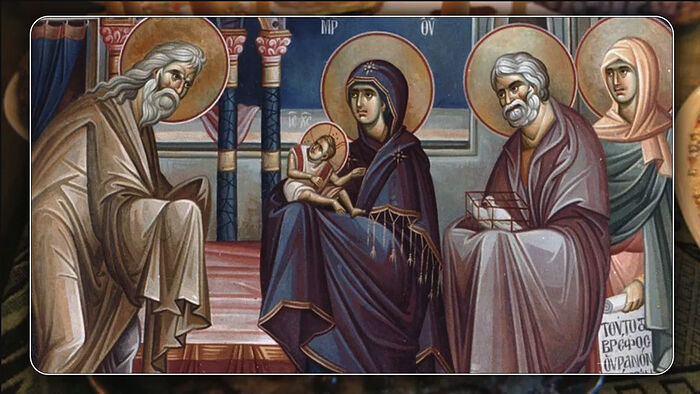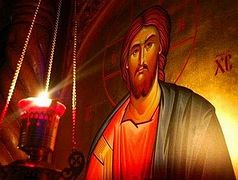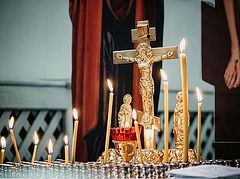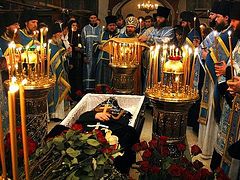Of the many questions that can be asked about our life on earth, is not the most important question, brethren, how best to die? Some, even from among the pagan sages, put all their human wisdom into this, calling it nothing other than the science of death.
Who will teach us this great science, so necessary for us all? Probably it is those who have themselves passed through the doors of the grave serenely, in peace, with joy, who are best suited to teach us. One of these—a truly blessed man—is the Righteous Simeon. Listen to what he says to God, ending his life: Lord, now lettest thou Thy servant depart in peace, according to Thy word! (Lk. 2:29). One might think the holy elder was in exile before this and is now returning to his native home; that he was hitherto in bonds, and now is going to his freedom. What bonded him so closely with this image of death, so terrible for us? Why does the coffin seem like a comfortable bed to him? Why does he so joyfully make haste to where others can’t even look without fear?
Part of this mystery is told us by St. Simeon himself: For mine eyes have seen Thy salvation, he cries to the Lord (Lk. 2:30). That is, it’s as though the righteous one said: “I have nothing left to do on earth, for I have seen everything—the Savior and salvation itself; having seen Him, I have nothing to fear beyond the bounds of the earth, for with Him—my all-powerful Savior—though I should walk in the midst of the shadow of death, I will fear no evil (Ps. 22:4).
But here, brethren, as I said, is only part of the mystery of St. Simeon; this is not the whole thing. The salvation seen by St. Simeon was seen by many of his contemporaries. They saw much more and much longer than him, though we don’t see in the Gospel that anyone other than St. Simeon said: Lord, now lettest thou Thy servant depart in peace! There was something about St. Simeon that he was able to take the salvation that he beheld on equal footing with others, and assimilate it more than the others.
This most important thing, which St. Simeon kept silent out of humility, is revealed by the Evangelist when he depicts the person of St. Simeon: The same man, he says of St. Simeon, was just and devout, waiting for the consolation of Israel: and the Holy Spirit was upon him. And it was revealed unto him by the Holy Spirit, that he should not see death, before he had seen the Lord’s Christ (Lk. 2:25-26). That is, all the virtues were gathered together in St. Simeon: Love for neighbor nourished love for God and the fear of God in him; fear and love strengthened his faith in the Redeemer; his faith attracted the Holy Spirit; the Spirit accounted him worthy of revelation and gave him the chance to behold the Savior; beholding the Savior banished the fear of death—and St. Simeon departed in peace to where others can’t even look without trembling!
Thus, here is the holy mystery of St. Simeon! This is how he came to such a precious opportunity—to die in peace! Whoever desires a death like his, let him walk his path: Be righteous and pious, believe in the Redeemer, try to become the dwelling place of the Holy Spirit—and you will be vouchsafed to behold your Savior!
And a peaceful death requires, first of all, truth and purity, brethren. It’s hard, in the course of life, when the conscience vividly presents any offense inflicted upon a neighbor, but it must be a hundred times more so at death, when the conscience itself becomes incomparably more vivid and pure. The fading gaze, of necessity, then looks for something to calm it. Judge what this comfort must be like when you are presented with the whole series of victims of your own cruelty and cunning!
And what about those terrible specters whose appearance often torments the dying? We’re accustomed to explaining their torments as the suffering of the body, but is the body to blame for everything? Ah, how we would hear something completely different from many of the dying if their tongues, bound by the bonds of death, had been given to tell us the terrible truth! The righteous experienced the sufferings of the body, but their souls departed to the Lord in peace. Why? Isn’t it because they lived with the Lord in peace? Isn’t it because their conscience, being completely peaceful, brought peace to the body, and the soul, being free from the burden of sins, therefore easily rose above the heart and soared to Heaven? As in life, so in death!
The second reliable remedy against the horrors of death, according to the example of St. Simeon, is love for God, or piety. It’s not difficult to guess how this remedy works and wherein lies its power. Look at a son who loves his father and has been parted from him for a long time! He’s ready to endure everything to return to his father’s house; he looks neither at the raging waves of the sea, nor the height of mountains, nor other dangers. So is a man who loves his Lord, who joyfully hastens to the door of the tomb, despite its narrowness and gloom, for he knows that it’s the sole path to returning to the Father’s house.
But without this love for the Heavenly Father, without this childlike attachment to the Heavenly homeland, the transition to the other world will necessarily be difficult and unpleasant. How can we peacefully go somewhere that we wouldn’t like to go to for all eternity? How can we appear before the God Whom we either forgot or offended all our lives? In such cases, the dying sinner is like a slave who’s caught in flight and forcibly returned to his master. Can the soul not but tremble and be tormented here?
The third means against the horrors of death, according to the example of the Righteous Simeon, is a living faith in the Redeemer. It’s bad, brethren, very bad, to go through life without faith; but it’s a hundred times worse at death. During life, many things apparently can replace faith, and unfortunately, they do for many; but alas, at death, nothing can replace it! The moments of death are clearly the most important and decisive: Can we rely on ourselves then, on our courage, our wisdom, even on our virtue?
At that moment, we disappear for the world, and the world for us; here is the end of the world for everyone, the Dread Judgment for everyone! Therefore, we need all-powerful help from above; we need not an intercessor, not an angel, but the Lord Himself. Heaven and earth hearken to His name alone; it is before Him alone that hell and all the evil spirits tremble. Therefore, it’s only with a living faith in Him that we can peacefully pass through the terrible abyss of corruption and go out into the freedom of the children of God without stumbling.
This need for faith in the Redeemer at death is perfectly expressed by the holy Church when it places a cross in the hands of every man who has died. But, brethren, for this cross to have power to act for us at death, it must first be active during our life, destroying our sins. The cross placed in the hands of the deceased remains in the coffin and decays with the body; the soul is accompanied by the cross that it erected for itself during its life. Would you like to know how this imperishable cross is erected? In two ways: First, by nobly enduring for the sake of the name of the Lord Jesus all the misfortunes and temptations by which providence visits every one of us for our purification; second, by exercising ourselves in various voluntary deprivations for the sake of His most holy name. Such a cross will not rot in the earth—the soul will stand before the universal Judgment with it; it will serve as its adornment for all of eternity!
The fourth reason why death was peaceful for the Righteous Simon is that he was filled with the Holy Spirit. It’s not hard to understand the effect of this reason. How can the angel of death bring his hand down hard upon one in whom he sees the Spirit of God? If the blowing of a cool wind can ease the sufferings of the sick, and the breath of a mother or friend can sweeten the languor of one lying on his deathbed, then what consolation is beyond the grace-filled breath of the Holy Spirit? Can He not but overshadow a soul on the brink of death that was faithful to Him throughout its life? Oh, blessed a hundredfold are the dead which die in the Lord from henceforth: Yea, saith the Spirit, that they may rest from their labours (Rev. 14:13).
And such blessedness, brethren, we might say, would be given to every one of us without any effort on our part if we didn’t deprive our own selves of it. That is, for all the importance of the gifts of the Holy Spirit, His grace descends into the soul of every man at the very beginning of his life—in the Sacrament of Baptism. At the same time, in the Sacrament of Chrismation, we are visibly sealed with the seal of the Holy Spirit. And we receive the grace of the Spirit throughout our lives, in all the other Sacraments, by the prayers of the Church and its pastors. In this way, we Christians are all Spirit-bearers from birth, and therefore, we ourselves possess a great remedy against the fears of death.
Why do most of us tremble? Because without the oil of good thoughts and deeds, the wind of the passions soon causes the fire of the Holy Spirit to fade in us, and the seal of deliverance fades and is wiped from the soul by the demonic provocations of the waves of the sea of life; because we are filled with the spirit of the world, which often turns into a whirlwind and blows us about like dust and brambles. And all the more so at death it can’t but burst forth with a stormy breath that shakes our entire mortal composition. Oh woe, brethren, great woe to whomever allows himself to be blown about by this corrupting spirit before his death! Its infernal breath will cool the soul on its deathbed, rot the heart, and disquiet all those who are departing this life!
The last thing for St. Simeon at the time of his death was that he saw the Savior of the world with his own eyes: Lord, now lettest thou Thy servant depart in peace, according to Thy word: for mine eyes have seen Thy salvation (Lk. 2:20-30). This is such an accompaniment that I don’t know whether to point it out to you as a general accompaniment for a peaceful end: How far it is from our thoughts, from our dispositions, from our lives! No, brethren, would it really be like this if we were more than Christians in name only?
It was promised to St. Simeon by the Holy Spirit that he wouldn’t see death before he saw Christ the Lord. And isn’t this promise given to us as well? Listen to what He Whom St. Simeon now carries in his arms says: He that loveth Me shall be loved of My Father, and I will love him, and will manifest Myself to him (Jn. 14:21). What could be clearer, more precise, and more decisive than this promise? Love the Lord, and you will see the Lord! How He appears to those who love Him, I can’t say, nor do you need to know in advance: This is the mystery of Him Who appears, Who reveals Himself at His visitation.
But there can be no doubt that when you see Him, you’ll forget all the beauty of the world and joyfully make haste to Him, to the abode of His Father, even if you have to get there by way of the cross. Oh, the Lord knows how to draw us after Him! (cf. Sg. of Sg. 1:4). The witnesses, all the holy men of God, who beheld the Lord in their souls, went to their deaths as a groom goes to marriage.
That His invisible appearance might be commemorated for those who are worthy, and replaced for the less worthy, the Lord appears at the bedside of nearly all who are sick, and visibly—in His Body and His Blood. If only we knew how to enjoy this theophany! If only we would make haste to the Lord at least here and be illuminated by the light of His face, before the light in our eyes fades; if only we would open our mouths and hearts for Him, before they’re closed forever by sickness!
But what actually happens? They consider the priest bearing the cup of life as the angel of death, and they try to avoid seeing him as long as possible! They receive the Body and Blood of the Lord when they can no longer receive anything, and thus they don’t meet, or we might say, they stumble over their Savior! Oh Lord, isn’t this why you lie here Yourself, and especially for the fall and rising again of many in Israel; and for a sign which shall be spoken against! (Lk. 2:34). It’s impossible to say whether such a sign serves for those who receive until life eternal, or unto judgment and condemnation. Indeed, here are revealed the thoughts of many hearts (Lk. 2:35), and what our life was like, and what we should expect after death!
But instead of liberating you from the fear of death, I imperceptibly induce fear in myself and in you. What should we do, brethren, when our lives are such that no matter what comforting words you might speak from this holy place, you will imperceptibly and involuntarily come to that which terrifies you! But this fear is unto salvation, while our false peace and our vain joys destroy us.
Let us conclude as we began. He who desires an end like that of St. Simeon, let him follow the path of St. Simeon: Be righteous, be pious, have faith in the Redeemer, and don’t let it fade. Acquire the Spirit and try to be worthy of beholding the Savior.
Amen.




